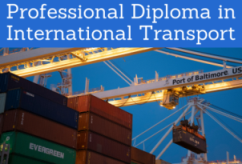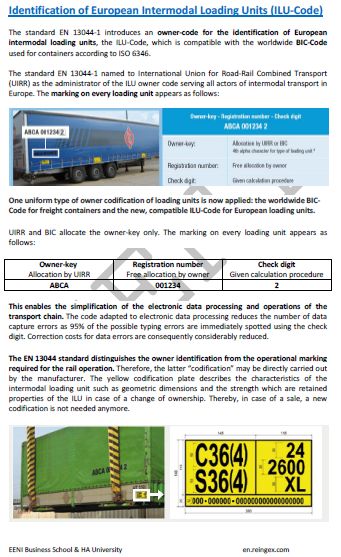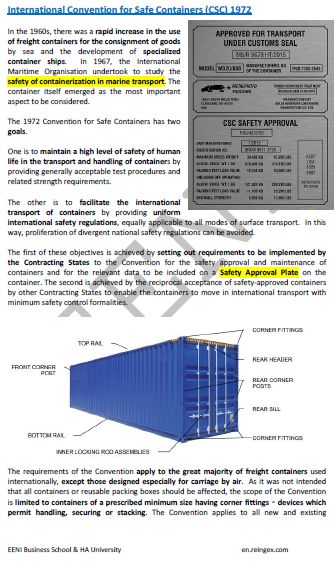Containers and International Transportation
Customs Convention on Containers. BIC Code. Intermodal Transport

The Bureau International des Containers (International Bureau of Containers and Intermodal Transport) was founded in 1933 as a neutral, non-profit international organization whose mission is to promote safe and sustainable expansion of Containerization and intermodal transport.
The BIC Code allows an adequate identification of containers and facilitates border crossing without delays
- Introduction to the Bureau International des Containers et du Transport Intermodal (BIC) / International Bureau of Containers and Intermodal Transport
- Container marking: code, number, Combined Data Plate, Mandatory Operational Marks
- Freight Containers-coding, Identification and Marking (BIC Code)
- BoxTech Global Container Database
- International Party Identification and Location Codes (LOCODES)
- International conventions related to containerization:
Sample - Containers and International Transportation:


The educational aims of the Subject “Containers and International Transportation” are the following.
- To understand the role of the International Bureau of Containers and Intermodal Transport
- To understand the importance of Containerization in international transport
- To learn about marking requirements for Containers (BIC Code, plates, identification...)
- To analyze the main international conventions related to Containerization

The Subject “Containers and International Transportation” is included within the curriculum of the following academic programs at EENI Global Business School:
Logistics Courses: International Transport, Maritime Transport, Multimodal, Road, Rail, Air, Transport and Logistics in Africa.
Certificate in International Transport

Masters: International Transport, Transport and Logistics in Africa.


Languages: 
 Contenedores
Contenedores
 Conteneurs
Conteneurs  Contentores.
Contentores.
The International Bureau of Containers and Intermodal Transport (BIC) publishes and maintains the BIC Code Register since 1970. The BIC Code is a container owner code.
- BIC Code or ISO Alpha Codes: International Identification Codes of Container Owners
- ISO 6346 Standard: Coding, identification and marking of cargo containers
The BIC Code (International Identification Codes of Container Owners) is accepted by:
- World Customs Organization (WCO)
- Customs Convention on Containers
- TIR Convention
- International Road Transport Union (IRU)
- International Union of Railways
- International Chamber of Shipping
- IATA

International Party Identification and Location Codes (LOCODES) of the UN: encoded geographic identification
The International Bureau of Containers and Intermodal Transport (BIC) is an observer member in:
- Chicago Convention (ICAO)
- International Maritime Organization
- World Customs Organization (OMA)
- United Nations Economic Commission for Europe (UNECE)
Currently, the International Bureau of Containers and Intermodal Transport has more than 2,300 enterprises that operate containers in more than 127 countries.
ILU Code for Road-Rail Combined Transport.
International conventions of the International Bureau of Containers and Intermodal Transport that have contributed to expansion of Containerization:
- Customs Convention on Containers (CCC) 1972
- Istanbul Convention de 1990
- International Convention for Safe Containers (CSC) 1972
In 1933, the International Chamber of Commerce created the International Bureau of Containers and Intermodal Transport
Headquarters of the International Office for the Containers and Intermodal Transport: Paris (France).
Source: International Office for the Containers and Intermodal Transport
Sample:
(c) EENI Global Business School (1995-2025)
Top of this page








 WhatsApp
WhatsApp